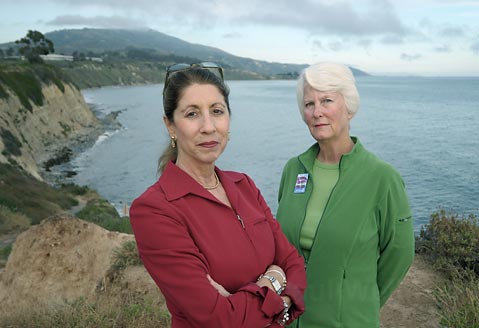Big Oil Takes On Small Town
Venoco’s Con Game in Carpinteria

As if signaling all its troubling features, Measure J comes packaged with a most unfortunate name: the Paredon Oil and Gas Initiative. In Latin America, political enemies were often sentenced to El Paredon — literally, to the wall, but meaning, of course, to the firing squad, which is not entirely unlike the presentiment stirring in the hearts of many Carpinterians in response to Measure J, the initiative sponsored by the Denver-based oil company Venoco.
As BP’s Deepwater Horizon rig continues to spew more than 200,000 gallons of oil daily into the Gulf of Mexico, Californians — and most especially Santa Barbara and Ventura counties — would be wise to consider the potential threat looming on their own shores should Measure J pass on June 8.
However, neither state nor county residents can vote on this crucial initiative. The only ones who can are 6,000 Carpinteria residents who live within the town’s postage stamp-size limits, and who are blasted daily with a lobbying campaign that appears to have exceeded $100 per voter.
Venoco’s targeting of Carpinteria and excluding of county voters was no accident. Initially, the oil company filed an application with the city, triggering the standard environmental review process. But, as that process began to reveal the damaging impacts of oil drilling on the town’s sensitive beach areas (scores of impacts were identified, 11 in the Class 1 category), Venoco pulled the plug on its application.
Instead, Venoco opted to do an end run around the town’s review process — the very same review that all project developers must go through — by buying itself a slot on the ballot. Using a tony public relations firm, and recruiters paid $3 per signature, Venoco purchased an initiative. Its campaign has been ceaseless: full-page color ads in local papers, CNN and local TV spots, relentless door-to-door canvassing of targeted voters, promising benefits and jobs, and even some folks paid $125 to show up at focus groups.
Should Venoco prevail on June 8, no amount of mitigation could offset the negative environmental impacts, public safety issues, endangerment of marine mammals, and potential water pollution. Indeed, believe it or not, Venoco would be entitled to bypass the entire city public review process: no local environmental analysis, no public hearings, no conditions to protect public health and safety.
More sadly, Measure J would negate the years of community planning and citizen vigilance that have fashioned Carpinteria into such a desirable town. Quaint neighborhoods, majestic views, serene coastal bluffs, and hiking trails would be shattered by the construction of a 175-foot oil derrick on beachside cliffs that overlook one of the last harbor seal rookeries on the California coast.
Minimally, Venoco’s project would introduce clanging pipes, noxious odors, and bright night lighting while flirting with all the risks attendant upon slant-drilling up to 35 wells for 20 to 30 years, or possibly forever. Indeed, passage of Measure J would grant automatic and open-ended approval for Venoco to do virtually anything it wants on its 35-acre property — as long as it relates to the oil- and gas-drilling project. No future city council would have the power to change this, even in the name of public safety.
And contrary to the message of Venoco’s ad campaigns, Measure J does not guarantee any money for Carpinteria. There are no guaranteed funds for public schools. In fact, according to its Security and Exchange Commission filings, Venoco is debt-ridden. It is kept afloat by huge loans at a whopping 11-percent interest. With a $150-million debt to pay off — and, as of December 2009, total indebtedness of $695 million — it’s difficult to imagine the company passing out free money to anyone. It’s even quite possible and plausible that Venoco will sell Paredon, as it has sold other oil projects.
And should there be a spill, explosion, or blowout, as there was at Venoco’s site in Glenn County in late April, the company does not have adequate insurance for all potential risks, according to its own financial statements.
Even the royalty issue — if Venoco should strike oil — is murky. Venoco only owns one of the three leases, according to its initial application. And the state, in desperate financial straits, could well be unable to honor any local share provisions.
Venoco has threatened voters by saying if they don’t get approval to drill onshore, they will go offshore and Carpinteria will lose its chance at royalties. In fact, if the company could go offshore, the same royalty conditions would apply. However, its chance of going offshore is slim to none, as the state has not allowed a new platform in the Santa Barbara channel since 1966. Moreover, reflecting the nationwide horror over the BP spill, both Governor Schwarzenegger and President Obama have kiboshed more offshore drilling.
Ironically, Measure J could destroy the very thing that led Carpinteria to become incorporated in 1965: local control. Moreover, it would set a precedent in which every town and city in California would be vulnerable to a corporate takeover via brass-knuckled manipulation of the initiative process.



